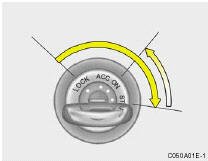Starting

Starting
WARNING:
Never run the engine in a closed or poorly
ventilated area any longer than is needed to
move your car in or out of the area. The
carbon monoxide gas emitted is odorless
and can cause serious injury or death.
Normal Conditions:
The Starting Procedure: 1. Insert key, and fasten the seat belt.
2. Depress the clutch pedal fully and place the gearshift lever (manual transaxle) in neutral or the selector lever (automatic transaxle) in "P" (park) position.
3. After turning the ignition key to the "ON" position, make certain all warning lights and gauges are functioning properly before starting the engine.
WARNING:
Be sure that the clutch is fully depressed
when starting a manual transaxle vehicle.
Your manual transaxle equipped vehicle will not start unless the clutch pedal is fully depressed.
4. Turn the ignition key to the "START" position and release it when the engine starts.
After the engine has started, allow the engine to run for 10 to 20 seconds prior to placing the vehicle in gear.
The starter should not be operated for more than 15 seconds at a time. Wait 15-30 seconds between starting attempts to protect the starter from overheating.
WARNING:
Always fully depress the brake pedal before
and while shifting out of the "P" Park position
into another position to avoid inadvertent
motion of the vehicle which could
injure persons in or around the car.
See also:
De-Humidified Heating
For dehumidified heating:
o Turn on the fan control switch.
o Push the air conditioning switch. The air conditioning indicator light should
come on at the same time.
o Set the air intake contro ...
Tire Balancing
A tire that is out of balance may affect handling and tire wear. The tires on
your Hyundai were balanced before the car was delivered but may need balancing again
during the years you own the car. ...
Maintenance Precautions
Improper or incomplete service may result in problems. This section gives instructions
only for the maintenance items that are easy to perform.
Several procedures should be done by an authorized Hy ...


